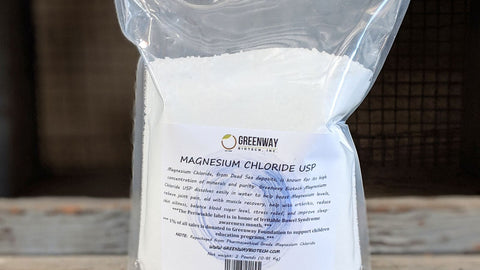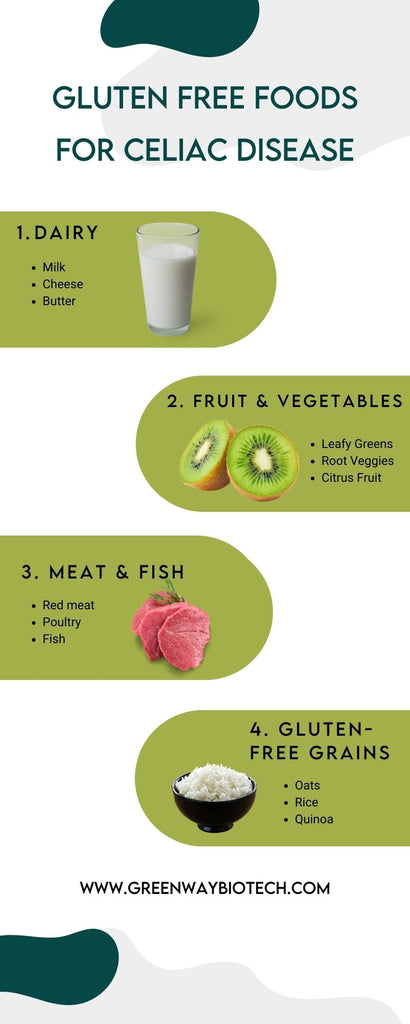What You Need to Know About Celiac's and Magnesium
•Posted on March 27 2024

In the world of autoimmune conditions, celiac disease stands out as a significant player, affecting millions of individuals globally.
Characterized by an immune response to gluten, a protein found in wheat, barley, and rye, celiac disease can have far-reaching implications beyond digestive discomfort.
One such implication is the potential link between celiac disease and low magnesium levels.
In this comprehensive guide, we'll delve into the intricacies of this connection, exploring the role of magnesium in celiac disease management and the best practices for ensuring optimal health for individuals with this condition.
Recommended for You:

Understanding Celiac Disease

Celiac disease is an autoimmune disorder characterized by an adverse reaction to gluten, a protein found in wheat, barley, and rye.
Upon gluten ingestion, the immune system launches an attack on the small intestine, resulting in inflammation and damage to its lining.
This damage impairs nutrient absorption, leading to a cascade of symptoms ranging from gastrointestinal distress to fatigue, nutrient deficiencies, and even neurological issues.
Beyond its digestive manifestations, celiac disease can have far-reaching implications for overall health and well-being.
Related Post: How to Improve Gut Health With Magnesium
Can Celiac Disease Cause Low Magnesium?

The intricate interplay between celiac disease and nutrient absorption can result in deficiencies, including low levels of magnesium.
The damaged intestinal lining in individuals with celiac disease impairs the body's ability to absorb essential nutrients adequately, including magnesium.
Consequently, even if individuals with celiac disease consume magnesium-rich foods, their bodies may struggle to absorb an adequate amount, leading to low magnesium levels.
Recommended for You:

Is Magnesium Beneficial for Celiac Disease?

Magnesium plays a crucial role in overall health, participating in hundreds of biochemical reactions within the body.
For individuals with celiac disease, ensuring optimal magnesium levels is particularly important due to the potential for deficiencies.
Magnesium contributes to muscle and nerve function, supports immune system health, regulates blood sugar levels, and aids in bone health – all areas that can be affected by celiac disease.
Related Post: Here's How to Easily Stop Bloating With Epsom Salt
Should Celiacs Take Magnesium?

Given the propensity for magnesium deficiency in individuals with celiac disease, supplementation may be warranted to address potential deficits.
However, it's essential to consult with a healthcare professional before starting any supplementation regimen, as individual needs vary.
Additionally, incorporating magnesium-rich foods into the diet can be beneficial for celiacs.
Examples of gluten-free foods high in magnesium include leafy greens, nuts and seeds, legumes, and whole grains such as quinoa and brown rice.

Recommended for You:

What Vitamin Deficiencies Does Celiac Disease Cause?

Celiac disease can lead to deficiencies in various vitamins and minerals due to impaired nutrient absorption.
Some of the most common vitamin and mineral deficiencies associated with celiac disease include:
-
Iron: Celiac disease can result in iron deficiency anemia due to poor absorption of iron from food. This can lead to symptoms such as fatigue, weakness, and shortness of breath.
-
Calcium: Damage to the intestinal lining may interfere with calcium absorption, potentially leading to osteoporosis or weakened bones. Individuals with celiac disease may be at a higher risk of developing bone fractures and osteoporosis due to calcium deficiency.
-
Magnesium: Magnesium deficiency can occur in individuals with celiac disease due to impaired absorption in the intestine. Low magnesium levels can contribute to muscle cramps, fatigue, and irregular heart rhythms.
-
Zinc: Zinc deficiency is common in individuals with celiac disease and can impact immune function, wound healing, and skin health. Symptoms of zinc deficiency may include hair loss, delayed wound healing, and impaired taste sensation.
-
Vitamin D: Celiac disease can hinder the absorption of fat-soluble vitamins, including vitamin D, leading to deficiencies. Vitamin D is essential for bone health, immune function, and mood regulation. Deficiency may result in weakened bones, muscle weakness, and increased susceptibility to infections.
-
Folate (Vitamin B9) and Vitamin B12: Damage to the small intestine in celiac disease can impair the absorption of folate and vitamin B12, both of which are crucial for red blood cell production and nerve function. Deficiencies in these vitamins can lead to megaloblastic anemia, fatigue, and neurological symptoms such as numbness and tingling in the extremities.
-
Potassium: Celiac disease may also affect potassium levels due to malabsorption in the intestine. Potassium is essential for maintaining proper fluid balance, nerve function, and muscle contractions. Low potassium levels can result in weakness, muscle cramps, and irregular heart rhythms.
Overall, individuals with celiac disease should be vigilant about monitoring their nutrient levels and addressing any deficiencies through dietary changes, supplementation, and close medical supervision to maintain optimal health and well-being.
Related Post: How Magnesium Supports a Healthy Detox
Best Magnesium Supplement for Celiacs

When selecting a magnesium supplement, it's crucial to opt for products that are gluten-free and well-tolerated by individuals with celiac disease.
Magnesium citrate and magnesium glycinate are often recommended for their high absorption rates and gentle effects on the digestive system.
These forms of magnesium are less likely to cause gastrointestinal discomfort, making them suitable choices for individuals with sensitive digestive systems.
Recommended for You:
Exploring Magnesium Chloride as a Supplement

Among the various forms of magnesium supplements available, magnesium chloride also stands out as a promising option for individuals with celiac disease.
Magnesium chloride offers high bioavailability, ensuring efficient absorption by the body.
Notably, our Magnesium Chloride USP supplement is a reputable choice, known for its purity and effectiveness.
This supplement provides a convenient and reliable means of replenishing magnesium levels in individuals with celiac disease, supporting overall health and well-being.
Recommended for You:

Can Topical Magnesium Address Magnesium Deficiency in Celiac Disease?

Topical magnesium, in the form of magnesium chloride oil like our very own magnesium spray or whipped magnesium cream, offers an alternative approach to addressing magnesium deficiency in individuals with celiac disease.
By bypassing the digestive system, topical magnesium absorption may circumvent the challenges posed by compromised intestinal function in celiac disease.
While more research is needed to establish its efficacy specifically in celiac disease, topical magnesium represents a promising avenue worth exploring under the guidance of a healthcare professional.
Some of our topical magnesium to support those with Celiac disease include:
Related Post: Is Magnesium Important for Vitamin D Absorption?
Conclusion

In navigating the complexities of celiac disease management, addressing nutrient deficiencies such as low magnesium levels is paramount.
By understanding the intricate relationship between celiac disease and magnesium deficiency, individuals can take proactive steps to optimize their health and well-being.
Whether through dietary modifications, supplementation with high-quality products like Greenway Biotech's Magnesium Chloride USP supplement, or exploring innovative approaches such as topical magnesium, there are various strategies available to support individuals with celiac disease in maintaining optimal magnesium levels and overall health.
Remember, prioritizing holistic care that addresses both nutritional needs and autoimmune management is essential for thriving while living gluten-free with celiac disease.
Comments
0 Comments
Leave a Comment